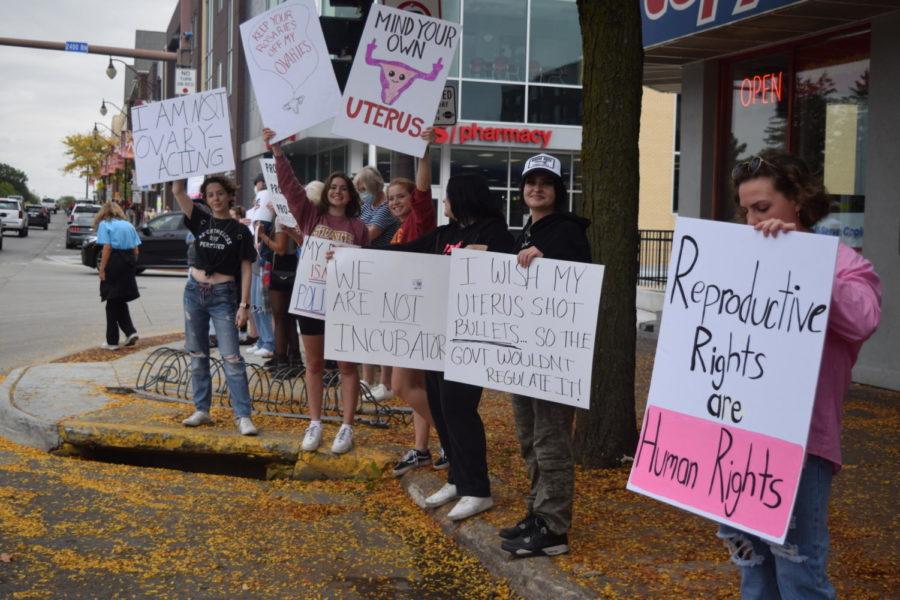Ames takes part in national protest to defend reproductive rights
October 3, 2021
Joining thousands across the country, a group of more than 30 people protested along Lincoln Way to defend reproductive rights on Saturday.
In light of the Supreme Court allowing the Texas heartbeat bill to take into effect, Women’s March and more than 90 organizations mobilized to protest. The Ames movement was organized by 18-year-old Austyn Vinchattle after reading about the call to action from the Women’s March website.
The march was also intended to be intersectional, addressing the attempt to control of reproductive rights over queer and trans folks, women and people of color.
Texas Gov. Greg Abbott signed into law a ban on abortions after the detection of a fetal heartbeat. Some states currently have trigger bans in place which established anti-abortion laws if Roe v. Wade, a nearly 50-year-old precedent, was overturned.
Such legislation is an obstruction to an individual’s right to determine what is necessary for their body and health, Vinchattle said. Standing alongside Vinchattle was her mom, Jessica Furman, a resident of Story City. When her daughter told her she was mobilizing this protest, Furman said she had to be there to support her and the movement.
“There are so many people trying to tell us what we can do with our bodies, and I don’t want anyone to take that right away from me,” Furman said. “I don’t have any issues with it myself and have never needed to take action on anything, but I don’t want to see anyone else have that (right) taken away from them that would change their life in a negative way. It is for nobody to tell us what we can and can’t do.”
The Supreme Court is set to hear arguments to challenge Roe v. Wade on Dec. 1. The challenge comes from a Mississippi abortion ban after 15 weeks of pregnancy. The ban has been blocked by lower courts for violating Roe.
There were over 650 locations across the country hosting Women’s March protests. Vinchattle said she was happy with the turnout. The protest also took place on the same day as the Iowa State versus Kansas football game. As people made their way to Jack Trice, some cheered or stopped for pictures with the protesters.
Cars honked as the activists marched from the intersection of South Sheldon Avenue and Lincoln Way to Stanton Avenue. Alexandra Abraham, is a sophomore majoring in event management at Iowa State, but they are originally from California where they have taken part in multiple protests in the past.
As a queer woman who attended school in a red-state, Abraham said she was nervous about what the push-back would be like in Iowa so she invited friends to attend the march with her.
“That just kind of gave me the confidence boost I needed to do the same thing I was doing at home to do it here too which is arguably even more important,” Abraham said.
Marchers reported some comments of opposition from people. Abraham said it was alway someone passing back and unwilling to have a conversation about the matter.
“They believe what they believe and don’t want to delve into it anymore, and it is really sad to see them say these things and then just walk away,” Abraham said. “Because there are those of us here that would take the time to have a conversation with them but they just see it as an argument.”
Elizabeth Woods wanted to attend one of the Women’s Marches and happened to be in Ames. Woods said while the Ames protest was smaller than ones taking place in Washington D.C., defending reproductive rights is still just as relevant, and generally their protest had been well-received by the public.
One of the few comments Woods heard was a group of men saying “save the babies.” In response, Woods and her friend created a signed that read “You are pro-life until the baby is poor, transgender, gay, Black or disabled.”
“As a person who was raised Catholic and went to pro-life marches you don’t think about it after the baby is born,” Woods said. “It is a very good cause that you don’t have to think about to get behind, because babies haven’t done anything before they are born. But once they are born do you support funding government assistance programs or maternity leave?”
Abraham said education is an important aspect to these conversations and even if a person walks away disagreeing with her, it could cause them to question the reasoning behind what they believe. Abraham also grew up in a Catholic family who wasn’t what she considered a firmly pro-choice family.
“My mom never said no to me researching and gaining knowledge and eventually because I had that knowledge I was able to form these thoughts of seeing how important pro choice is,” Abraham said. “So that is the goal of having those conversations.”

















